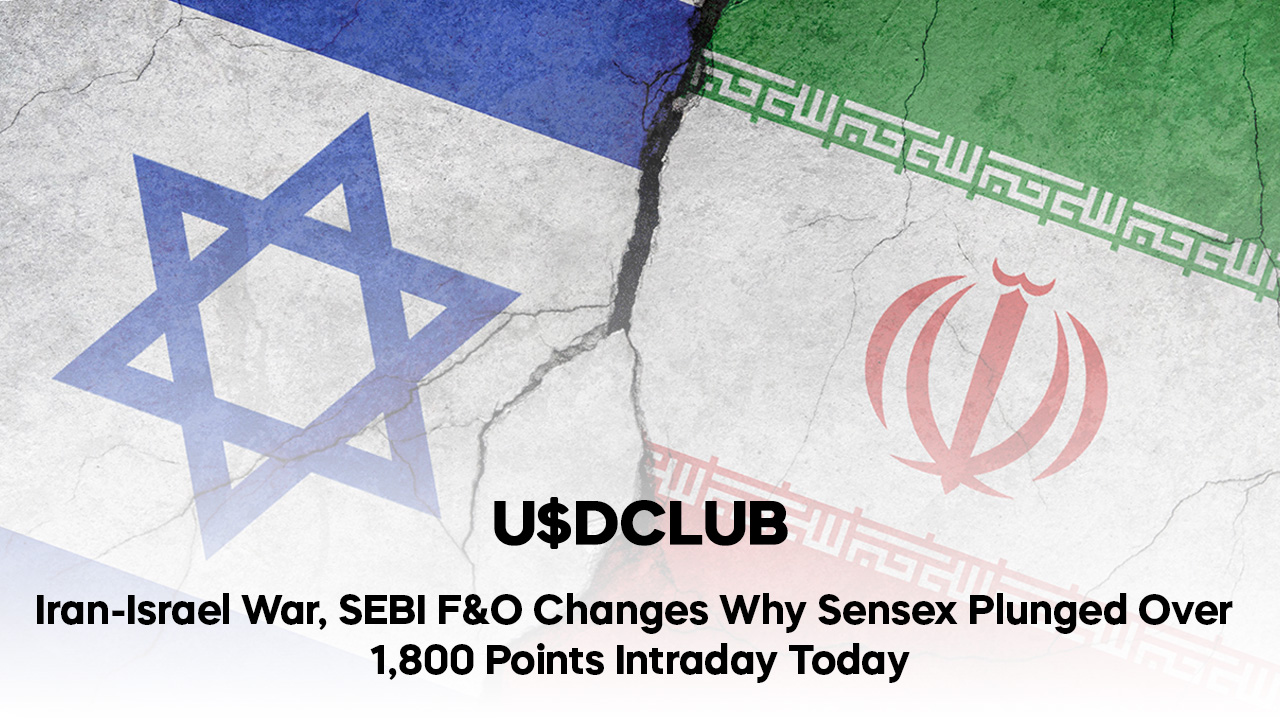In a dramatic turn of events that has sent ripples through global financial markets, the Bombay Stock Exchange’s Sensex witnessed a staggering intraday plunge of over 1,800 points today. This sharp decline can be attributed to several intertwined factors, including escalating tensions between Iran and Israel and new regulations from the Securities and Exchange Board of India (SEBI) concerning futures and options (F&O) trading.
The Iran-Israel Conflict: An Overview
The ongoing conflict between Iran and Israel has a long and complex history, marked by mutual animosity and geopolitical maneuvering. The recent escalation began with military clashes that have raised concerns about regional stability and potential spillover effects. This situation has created uncertainty in financial markets worldwide, and investors are reacting cautiously to the potential consequences.
Recent Developments
Military Engagement: Reports indicate that military engagements have intensified, with both nations exchanging fire and conducting airstrikes. This has heightened fears of a broader conflict in the Middle East.
Oil Prices Surge: Geopolitical tensions typically lead to fluctuations in oil prices. With Iran being a significant oil producer, any escalation in conflict can drive prices upward, affecting global markets. Today, crude oil prices surged, adding to inflationary pressures.
Investor Sentiment: The market sentiment has soured as investors grapple with the uncertainties surrounding the conflict. Many are opting for safe-haven assets like gold and government bonds, leading to a sell-off in equities.
The Impact of SEBI’s F&O Regulations
Simultaneously, the Indian markets were also responding to new regulatory changes announced by SEBI regarding futures and options trading. SEBI has imposed stricter rules to safeguard retail investors and improve market integrity.
Key Changes in SEBI’s F&O Rules
Weekly Options Limitation: Starting November 20, 2024, SEBI has mandated that only one weekly options contract will be allowed per exchange. This decision aims to simplify trading and enhance liquidity but has also sparked concerns among traders accustomed to a broader selection of contracts.
Increased Margin Requirements: SEBI has also announced higher margin requirements for futures and options trading, which is expected to limit excessive speculation. While this may protect retail investors, it has created apprehension regarding liquidity in the derivatives market.
Market Reaction: The combination of these regulatory changes and the global geopolitical crisis contributed to a wave of selling in the markets, further exacerbating the decline in the Sensex.
Analyzing the Market Plunge
As the Sensex plunged over 1,800 points intraday, it is essential to analyze the various factors contributing to this dramatic market reaction.
-
Investor Panic and Selling Pressure
The dual impact of geopolitical tensions and regulatory changes has created a perfect storm of uncertainty. Investor panic often leads to herd behavior, prompting many to sell off their holdings rapidly to mitigate losses. This selling pressure can trigger further declines as market participants react to falling prices.
-
Sectoral Impacts
Different sectors have reacted variably to these developments.
Energy Sector: Stocks in the energy sector experienced heightened volatility due to rising oil prices, with companies closely tied to global oil markets feeling the pressure.
Financials: The banking and financial sectors, which often bear the brunt of increased margin requirements, saw significant declines as investors recalibrated their expectations for earnings growth amid regulatory changes.
Consumer Goods: With rising oil prices potentially leading to higher inflation, consumer goods companies faced headwinds as consumer spending may contract.
-
Global Market Influences
The fallout from the Iran-Israel conflict is not confined to Indian markets alone. Global markets also reacted negatively, with significant declines in European and Asian indices. This interconnectedness amplifies the effects of geopolitical events, as global investors adjust their portfolios based on perceived risks.
The Broader Economic Context
In addition to the immediate factors influencing the market plunge, broader economic conditions play a crucial role in shaping investor sentiment.
-
Inflationary Pressures
Rising oil prices can exacerbate inflation, which remains a significant concern for many economies, including India. Persistent inflation can lead to tighter monetary policies, affecting economic growth and corporate profitability.
-
Interest Rate Expectations
The response of central banks to inflationary pressures influences market dynamics. Higher interest rates can lead to increased borrowing costs for businesses and consumers, impacting overall economic activity.
-
Economic Recovery Post-COVID
As economies worldwide continue to recover from the pandemic, any geopolitical uncertainties can undermine investor confidence. The perception of a fragile recovery can exacerbate market volatility, as investors weigh the potential impacts of external shocks.
Market Outlook: What Lies Ahead?
With the Sensex experiencing such a significant decline, many investors are left wondering what the future holds.
-
Geopolitical Developments
The situation between Iran and Israel will remain a crucial factor influencing market dynamics. Any de-escalation in tensions could lead to a rebound in market sentiment, while further escalation could intensify the downward pressure.
-
Response to SEBI Regulations
Traders and market participants will need to adapt to the new F&O regulations. As the market adjusts, there may be opportunities for savvy investors who can navigate the changing landscape effectively.
-
Focus on Safe-Haven Assets
In uncertain times, many investors turn to safe-haven assets. Gold, government bonds, and defensive stocks may see increased demand as investors seek to protect their portfolios.
Conclusion: Navigating a Turbulent Market
The dramatic plunge in the Sensex today underscores the interconnectedness of geopolitical events and market dynamics. As tensions between Iran and Israel escalate and SEBI implements new regulations, investors face a complex landscape that requires careful navigation.
While the market may experience volatility in the short term, astute investors may find opportunities amidst the chaos. Staying informed about global developments, regulatory changes, and economic indicators will be crucial in making informed investment decisions.
For more updates on the latest developments in the cryptocurrency market and insightful investment strategies, stay tuned to USDCLUB.us, where we provide timely news and analysis from the world of finance.

